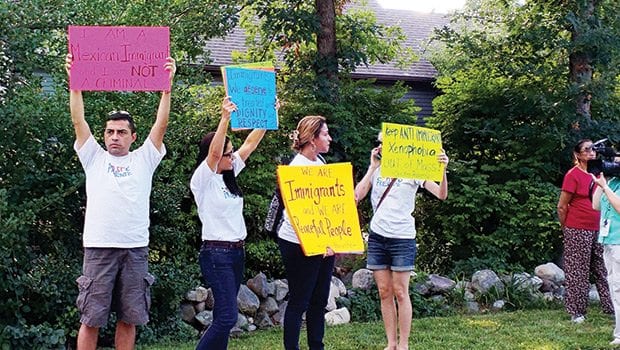Trump’s rise pushes GOP further right
Dog-whistle rhetoric alienates large segments of electorate

At a news conference last week, Donald Trump told Mexican American news anchor Jorge Ramos — who often is called the Walter Cronkite of Latino America — to “go back to Univision” after he questioned the Republican presidential frontrunner about his immigration plan.
For many political observers, the comment was a form of racial dog whistling, a not-so-subtly coded way of saying, “Go back to Mexico.”
“I found his quite demonstrative approach in shutting him down in the way he did to be a kind of symbolic battle with the Latino presence in the United States,” says Matthew Hughey, co-author of the book, “The Wrongs of the Right: Language, Race, and the Republican Party in the Age of Obama.” “It set Trump up to be this victorious, politically-incorrect white warrior. He was trying to send a message that he’s a man about business, he’s going to guard the border, and he’s not going to let people speak to him that way, especially people who aren’t white.”
But most of Trump’s rhetoric has been far more explicit. In June, the real estate mogul called Mexican immigrants “rapists,” accusing them of “bringing drugs” and “bringing crime” into the United States. In July, he said that if elected president, he would build a wall along the Mexican border — and that Mexico would pay for it. In August, he called for the mass deportation of all undocumented immigrants and an end to birthright citizenship, which has been guaranteed since 1868 by the 14th Amendment of the Constitution.
Hughey says that xenophobic and nativist language has been used throughout the history of American politics. What’s different about Trump is his use of explicit language in the post-Civil Rights era. “I find it striking that his comments are so overt in an era in which racist rhetoric is a lot more subtle and colorblind on the surface,” he says.
But Hughey isn’t surprised that this racism has resonated with a large segment of Americans. “Social scientists have found over the past decade an increasing amount of white victimization attitudes, in which whites feel that they are economically, socially and politically disenfranchised and discriminated against the most,” says Hughey, also associate professor of sociology at the University of Connecticut. “Those attitudes are a 180 from the reality of the situation — when you look at political, social and economic wellbeing, whites are doing better than most people of color — but that reality doesn’t stop the attitude from proliferating.”
While many of Trump’s incendiary comments have shocked political observers, they haven’t shocked Latino voters, says Gabriel Sanchez, director of research for Latino Decisions, a leading Latino political opinion research group. “For most Latino voters, this is just piling on to the already existing baggage with the GOP on inflammatory immigration language,” he says. “It’s not as though Republican support is going to drop extensively, because it’s already at low levels.”
Trump’s platform isn’t too far off from other politicians’, explains Sanchez. Mitt Romney called for “self-deportation” in the 2012 election, and the Obama administration has deported more undocumented immigrants than any other president in U.S. history. Trump’s call to end birthright citizenship also isn’t new: In 2011, four Republican congressmen introduced legislation to do the same thing. “Post-2006, the political climate surrounding immigration policy has been pretty rough for Latinos,” says Sanchez, “so this is just another more recent example of the same rhetoric.”
Anti-immigrant climate
A national poll conducted in May — before Trump declared his bid for the presidency — found that 74 percent of Latinos felt there was an anti-Hispanic and anti-immigrant climate in the United States.
But is this inflammatory rhetoric — what Hughey calls the “Second Southern Strategy” for its similarity to Richard Nixon’s plan to appeal to white voters’ racism against African Americans — a winning tactic? While racial appeals have helped candidates win in the past, and may energize the conservative Republican base this year, Sanchez says it’s unlikely to play well in next year’s general election.
Sanchez says that Latino voters are “incredibly important” to winning a presidential campaign. In 2012, Latinos represented 10 percent of all voters, and in 2016, that number is only expected to grow. In addition to the overall size of the Latino electorate, it also plays a key role in many battleground states such as Colorado, Nevada and Florida.
Mitt Romney won about 23 percent of the Latino vote in 2012 — “the lowest a Republican candidate had in 10, 15 years,” says Sanchez — and unless the next GOP candidate exceeds this number, he or she would have to lock up more than 60 percent of the white vote to win the election, something very difficult to do. (Ronald Reagan won 66 percent of the white vote in his 49-state victory in 1984.)
A Gallup poll of Hispanic attitudes towards the Republican presidential hopefuls revealed last week that Donald Trump is by far the least popular candidate. With a net favorable score of -51, Trump stands way behind the rest of the GOP field. Rick Perry and Ted Cruz, the next most unpopular Republicans among Hispanics, both have net favorable scores of -7, while Jeb Bush, the most popular candidate, rates at +11. Democratic frontrunner Hillary Clinton, by contrast, has a net favorable rating of +40.
While Republicans have long faced an uphill battle winning Latino votes, Trump’s anti-immigrant rhetoric only makes it worse. “The party brand among Latinos is already very, very low,” says Sanchez, “so I think it’s a question of whether this will be the death blow among Latino voters for some time.”






